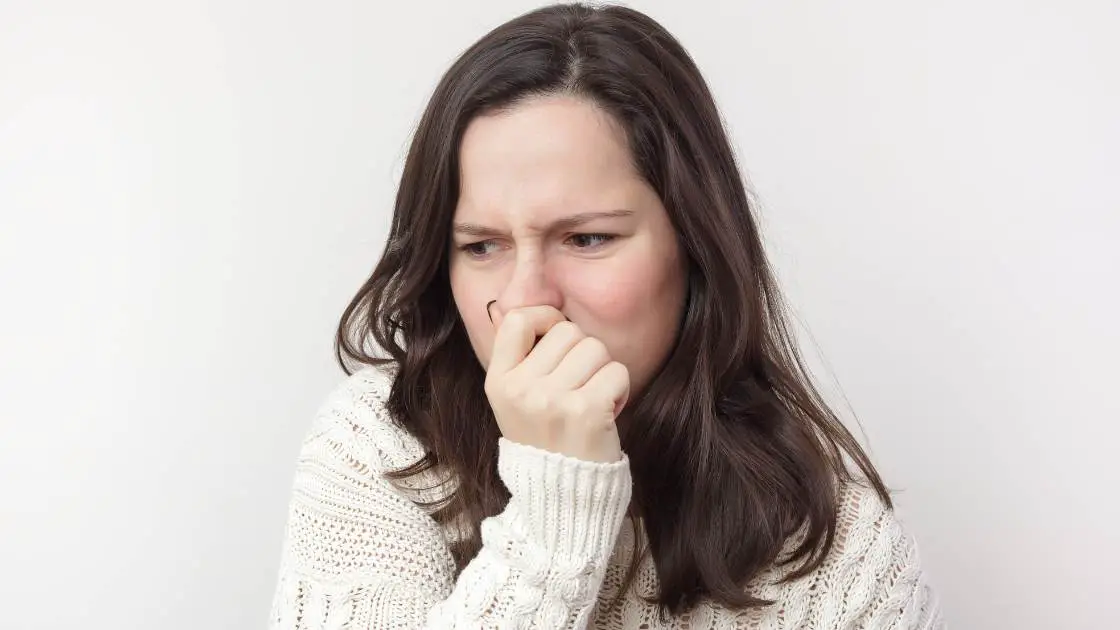Have you been enjoying a pleasant summer day and discovered a whiff of this terrible rancid odor coming from your AC system?
I’ve certainly had it happen to me (in both my home and my car), so I know how gross and unsettling it can be.
Your home is supposed to be your sanctuary and this foul odor can definitely put a damper on your ability to unwind and enjoy your home.
So, in this article, I am going to cover what is causing that dead animal stench and provide tips on how you can remedy it.
Let’s get into it!
The information contained in this post is for informational purposes only. It is not legal advice. You should seek the advice of a qualified legal professional before making any decisions relating to the topics covered by this article.
We may earn commissions from products and services that are purchased or recommended through our website as part of our affiliate partnerships. As an Amazon affiliate, we may earn from qualifying purchases.
What Creates the Smell of a Dead Animal in the AC?
The obvious answer here is a dead animal, right?
While true, there are actually a number of things that could be responsible for that smell. Here are some of the most common causes:
Rats, mice, squirrels and even birds can get into the AC unit or vents and become trapped. They eventually die and start to decompose, which results in a really unpleasant and unmistakable rotting meat odor.
Animal hair or droppings can accumulate in the AC or air ducts. This can include animal fur, feathers, or feces from various creatures that may have gotten access to the AC system. As these things start to age, they can emit a foul odor that can be easily mistaken for a dead animal smell. The same can happen if there is a bird or squirrel nest in the AC system.
Mold or bacterial growth. If there is a significant amount of mold or bacteria in the AC unit, filters or vents, they can product a smell that is musty and unpleasant. To the unitiated, they may simply smell a pungent type of odor and believe it is due to a dead animal. This can happen with HVAC systems that are not regularly cleaned and serviced.
Health Hazards of Dead Animal Smell in the AC
The presence of dead animals, animal droppings, and mold can all lead to potential health hazards. Here are some of the things you need to look out for:
Possibility of exposure to mold and harmful bacteria: Mold is never a good thing in the home. Those mold spores can lead to respiratory and other issues, especially with those folks who already suffer from lung conditions (like asthma) or allergies or weakened immune systems.
Dead Animal Fumes: The smell of a dead animal decomposing is not, by itself harmful to your health, but if you are nearby and inhale harmful gases and particles from the decaying animal, you could get sick.
Rodent Droppings: It is well documented that inhaling droppings from rodents can make you ill. According to the CDC, hantaviruses can be spread by inhaling such droppings, which can lead to a host of health issues.
Poor Air Quality: While not a health hazard per se, the scent of a dead animal may persist for long periods of time, making it harder to breathe. The indoor air quality of a place that is filled with dead animal gases and particles is not great and will definitely diminish the overall quality of life for residents.
How to Remedy Dead Animal Smell in the AC
If you smell a dead animal in your AC, you should take prompt action to find out what is causing it.
The best option is to call in an HVAC professional who is trained in identifying and resolving these issues. In the meantime, here are some things you can do if that is not a feasible or immediate option.
Look in the areas you can access and see if you can discover the source of the odor. If you find a dead animal, obviously you should remove it and clean it with disinfectant. Make sure you wear gloves and a mask to prevent any significant exposure to harmful germs or bacteria.
If you find animal droppings or feathers, or even a nest, remove as needed and clean the area, using the same process and precautions as highlighted above.
Mold or other growths can also be removed by using a simple bleach solution (one cup of bleach mixed with one gallon of water). Or you can use an ammonia mixture (50/50 mix of ammonia and water). Make sure you get all of it and dry the area.
Conclusion
In conclusion, a dead animal odor coming from your air conditioner is not only unpleasant, it can pose health risks, so you should find the source and remediate it as soon as possible. Hope this has been helpful and happy renting!
Related Reading:

